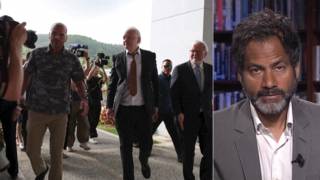
As Julian Assange returns to his native Australia, press rights advocates warn that his case could cast a long shadow over journalists’ work to investigate and expose government secrets. The WikiLeaks founder has pleaded guilty to one charge of violating the U.S. Espionage Act as part of a deal with the Justice Department that lets him avoid further prison time following five years behind bars in the U.K. awaiting possible extradition to the U.S. He had been facing a possible 175 years in U.S. prison if convicted on all charges related to his publication of classified documents in 2010 that revealed U.S. war crimes in Iraq and Afghanistan. “I don’t think this is an unmitigated victory for press freedom, because we do still have this plea agreement in which Julian Assange essentially agrees that he has spent five years in custody for the kinds of acts that journalists engage in all the time,” says Jameel Jaffer, director of the Knight First Amendment Institute at Columbia University and previously the ACLU’s deputy legal director.
This content originally appeared on Democracy Now! and was authored by Democracy Now!.